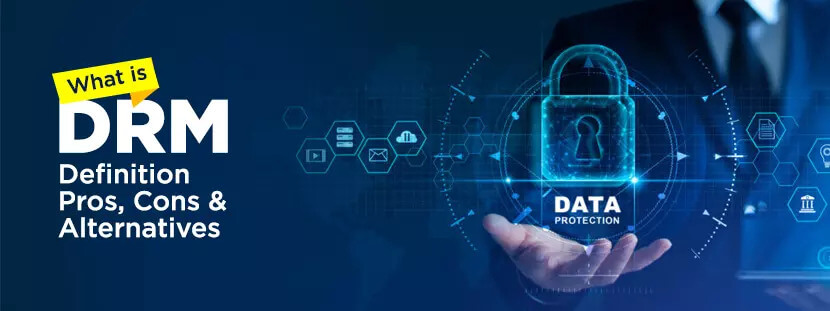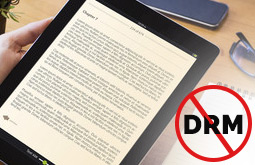What is DRM: Definition, Pros, Cons, and Alternatives
Digital book readers may have probably heard of the term DRM. However, only a few are aware of what it exactly is and what role it plays in eBooks publishing.

DRM is becoming increasingly important with each passing day as more and more content is being shared through the internet. It has become a requirement for many organizations to prevent their content from getting copied, redistributed, or converted.
In this post, we’ll first discuss the basics. Then, we will learn about the pros and cons of DRM and a few other alternatives for it.
What is DRM?
Digital Rights Management, DRM for short, is where various technologies are used to control and manage access to copyrighted works. So, basically, it protects the copyright holder's rights and stops the unauthorized use of their content -copying, modification, and distribution.
Importance of DRM
Authors usually put a lot of time and effort into writing books. They may also invest a little bit of money to market those eBooks. So, nobody will want their efforts to get wasted and their books to be stolen. That’s why they need DRM. DRM can help them protect their eBooks and prevent them from getting illegally copied or pirated.
Examples of DRM
-
Amazon DRM
Amazon’s own DRM is used on all their digital books. It means to view or read a Kindle eBook, you need to buy a Kindle or download the Kindle app. You also cannot share the Kindle DRM files by copying them. For this, you need to go through Amazon’s lending program and that is limited.
-
Apple FairPlay DRM
Apple has its own DRM, which is used by iTunes. So, the eBooks downloaded here can be only accessed on Apple Books app.
-
Adobe DRM
You may also view content via Adobe Digital Editions, which is a software developed by Adobe to unlock DRM. However, once you buy a book and open it on Adobe Digital Editions, it will be connected to your Adobe account, which can’t be opened by anyone else.
Merits of DRM
Enabling DRM will add an extra layer of protection to your eBooks. You can prevent unauthorized access and sharing of your copyrighted files. But DRM may not completely stop all piracy.
There are ways for DRM removal and people may use them to remove DRM from your eBooks. Enabling DRM helps to protect your copyrighted work. Since authors don’t want someone to steal their work, using DRM is suggested.
Demerits of DRM
The demerit of DRM is that it penalizes the customers of the eBook. Readers usually like to access their eBooks on multiple devices. However, the DRM-enabled ones can prevent access from happening by allowing access to eBooks only on the respective e-reading platform.
It may annoy some customers, which may result in a loss in sales of the eBooks as readers may not be interested in buying the DRM-protected eBooks anymore.
Note: The DRM technology will indeed help you to inhibit unauthorized access to your eBooks. However, this only applies to honest customers, i.e., the ones who pay and purchase an eBook. The ones who don’t want to pay will work hard on removing the protection. So, in the end, DRM doesn’t stop piracy.
Alternatives to DRM
If you’re wondering whether there are any alternatives to DRM, then, yes, there are!
Let’s check out the different alternatives to DRM below.
-
EditionGuard
It can help in protecting intellectual property, starting from eBooks, e-courses, classified reports, confidential documents, and more.
-
PrimetimeDRM
This fully-featured DRM software is designed to serve small and mid-sized enterprises and agencies. It provides end-to-end solutions for license management, subscription management, audio and video protection, etc.
-
Bynder
With this digital rights management software, you can enhance usability and user interface. It also offers digital asset management solutions for improving marketing assets.
-
Seclore EDRM
Seclore EDRM can help you with managing enterprise digital rights, secure file sharing, file access control, file usage tracking, etc.
Conclusion
All the Digital Rights Management software discussed above offers similar benefits to DRM at cost-competitive prices. You may analyze and choose one of them if it suits your business needs.
However, there’s one thing about DRM that every eBook reader must know, i.e., it is not legal to share an eBook with others whether it is with or without DRM. All copyrighted books are required to be purchased or else it will be considered illegal.




